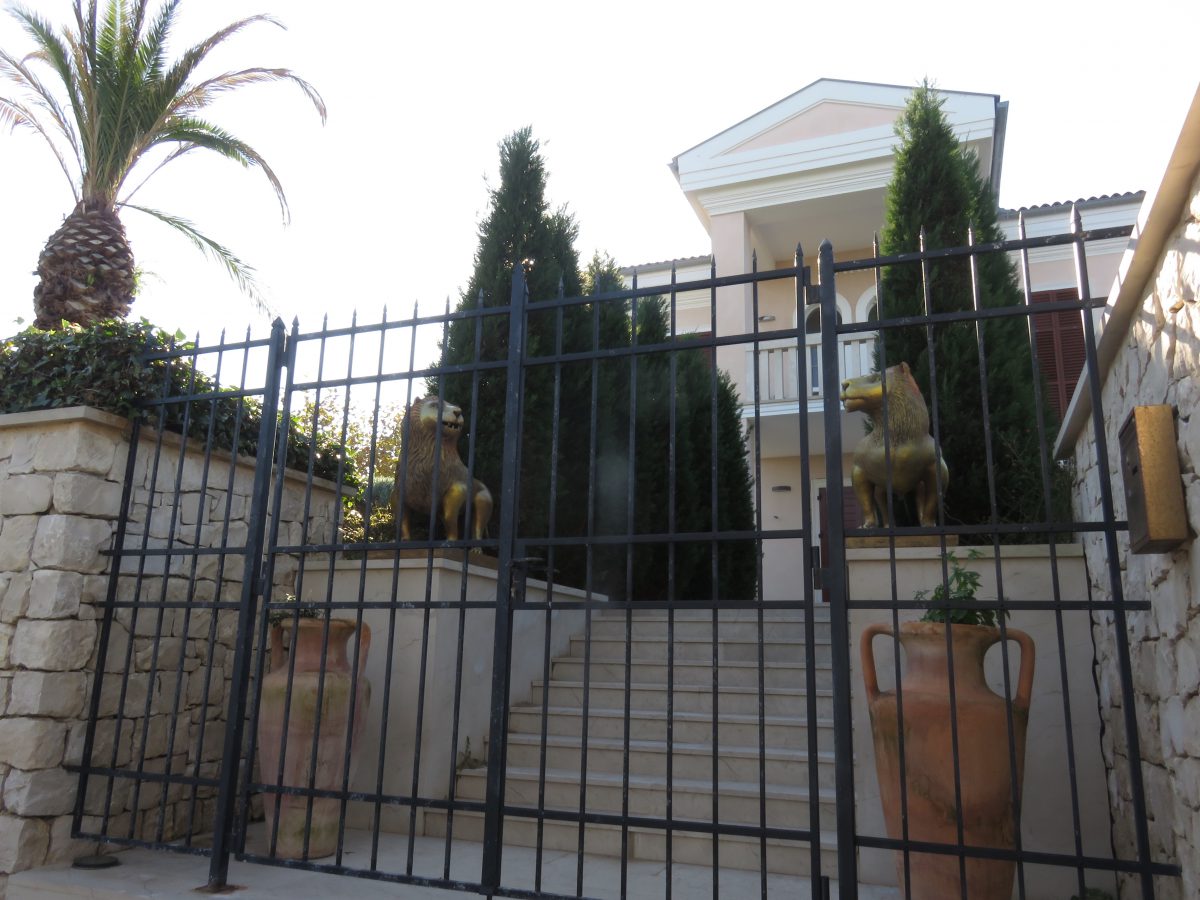He was an interpreter for the Hungarian Prime Minister’s friend. Now he is a major player in state-funded railway projects

In the beginning of 2015, a boat on board with Lőrinc Mészáros arrived at a tiny Croatian island called Ugljan. The Hungarian billionaire, a close friend of Hungarian PM Viktor Orbán, intended to buy a lodge on the island. He saw a local real estate ad about an Italian-style villa built in 1924. It was one of the first modern villas in Ugljan, fully refurbished a few years earlier. Mészáros was interested in buying it, but needed some help.
Mészáros does not speak English or Croatian, so the local real estate agent got a phone call from a “well-mannered, elderly man”, the Croatian-speaking Ferenc Sakalj. According to the agent, who asked for anonymity, Mészáros and Sakalj were “tough negotiators” but eventually they could agree on a good “market price”. (He refused to tell Direkt36 the exact amount.)
The building was sold in May 2015, the buyer was a Croatian company called Mirno More d.o.o., owned by Mészáros and Mészáros Ltd, one of Mészáros’ companies. Ferenc Sakalj was appointed as CEO of the Croatian company.
Later, Sakalj was introduced as a sports manager and Mészáros’s representative in Osijek, where the Hungarian billionaire bought a football team. Yet, Sakalj did not only appear in Croatia: a few months ago, he became the sole owner of Vasútautomatika Ltd, a new Hungarian rail construction company, which is already a subcontractor in two major state rail investments, one in Esztergom and one near Lake Balaton. Lőrinc Mészáros had already been a significant player in the lucrative industry through his company called R-Kord Ltd., but now there is another company that can be linked to him.
We can only do this work if we have supporters. Become a supporting member now!
The purchase of Vasútautomatika Ltd. is also a story of how Mészáros and his circles are taking over a market that used to be dominated by Lajos Simicska’s Közgép group. The Vasútautomatika Ltd. gained most of his workers and assets from the rail construction company of Közgép. Simicska was a long-time friend and ally of prime minister Viktor Orbán, and his companies had become frequent tender winners after Orbán’s victory in 2010. However, the two men had a falling-out in 2014, and since then Mészáros, Orbán’s other friend, has emerged as one of the most successful bidders in state procurements.
Direkt36 contacted Mészáros and Sakalj, but neither of them responded to our inquiries.
He came from nowhere, then became a sports manager
Ferenc Sakalj (or as many of his acquaintances know him, Szakály, a name some of his relatives also share) had not been a known associate of Mészáros Lőrinc until recently. According to corporate documents, he was born in 1956 in the Serbian (then Yugoslavian) Zenta, but later he had four different Canadian addresses, and his current official address is also Canadian.
He has founded a few companies in Hungary in the ’90s but these did not turn out to be prosperous businesses. None of them was involved in any sports-related activities either, yet Sakalj was introduced as a sports manager at Eszék, as he made his appearance at the football team that was acquired by Mészáros. His task was to “coordinate the closure of the deal,” and to represent the Hungarian owner in the management board. Simultaneously, Sakalj also founded a company in Eszék, called NK OS d.o.o., which is in charge of the football team’s management and its event planning activities, corporate records show.
As a sign of his importance, he was seated in the front row, right beside Mészáros at the 70th anniversary celebration of the football club, wearing the team’s official white and blue scarf. A month before that, the club’s homepage featured a post about Sakalj (named as vice president), describing that he travelled to the Costa del Sol in Southern Spain to pay a visit to the team, whilst they were at a training camp there.
The state pays first, then Sakalj enters
During 2016, Sakalj established links with Hungarian companies benefiting from state-funded programmes. First, he bought a 25 per cent share of a mailing company last April. City Mail Hungary Ltd. was described in the Hungarian press as the only potential competitor of the Hungarian state postal company Magyar Posta Ltd. City Mail was the only business given a state license to deliver mail in large quantities – for example from banks or public utility companies to their customers. The company’s majority owner is Ivan Mestrovic, leader of the football club in Osijek.
A few months before Sakalj became member of the company, an affiliate of City Mail, called City Mail Konszolidátor Ltd. gained 46 million HUF (approx. 150.000 euros) of EU money. A venture capital fund called Prosperitás decided to support the startup. This is one of the so-called Jeremie-funds, a controversial programme financed mainly by the European Union (see Direkt36’s series of articles about the Jeremie-funds). So far, City Mail has failed to become Magyar Posta’s real competitor: in 2015, it had a total loss of 53 million HUF (172.000 euros) while having only 11 million HUF (about 36.100 euros) in annual revenues. The subsidiary company’s numbers were similarly disappointing: its annual loss was nearly 16 million HUF (52.000 euros). City Mail Hungary Ltd. did not answer Direkt36’s questions.
Here’s how a Simicska-company turns into a Mészáros-company
The Szombathely-based Vasútautomatika Ltd., which Sakalj took over last December, seems to be a more promising business opportunity than City Mail. The company already participates in two expensive state projects as a subcontractor.
Vasútautomatika Ltd. was originally founded in March 2016 by the Austrian construction giant, Swietelsky. Swietelsky had already had a rail construction branch but with the new affiliate, the group entered the very specialized market of rail signalling services. The new company entered the scene by participating in the public procurement process of the renovation of Budapest’s Metro 3 line’s railway interlocking system (although the tender was later withdrawn).
Around the same time, the company took active steps to take over the assets and workers of a similar company, Dunántúli Ltd. This firm was part of Lajos Simicska’s empire, and had been among the biggest railway construction companies in the Hungarian market, making huge profits (e.g. in 2015 its annual income was 25 billion HUF, more than 80 million euros). Yet, soon after Simicska and Viktor Orbán had split up – reportedly over their differences about the government’s media strategies and the country’s overall direction -, his companies stopped winning in public procurement processes. Thus, Dunántúli Ltd. too lost most of its sources of revenue, and the management eventually decided to gradually leave the rail construction market.
On 26 April in 2016, the business director of Dunántúli Ltd. sent an email to rail construction companies in Hungary, offering its assets for sale. The email, seen by the reporter of Direkt36, contained a detailed list of the company’s assets and unused materials. The latter cost 515 million HUF (cca 1.67 million euro), the former 124 million HUF (cca 400.000 euro) in total.
According to a source familiar with the rail construction market, strategically important assets were eventually purchased by Vasútautomatika Ltd. and R-Kord Ltd. (owned by Lőrinc Mészáros). Today, the seat of Vasútautomatika Ltd. is at the former headquarters of Dunántúli Ltd. in Szombathely.
Many of the employees of Dunántúli Ltd. were also taken over by Vasútautomatika Ltd. (while some others ended up working at R-Kord Ltd.). Official company data show that during 2016, the number of workers at Dunántúli Ltd. shrinked from around 200 to only 8. Meanwhile, R-Kord’s number of workers grew by a few dozens. At Vasútautomatika Ltd., which had officially only 1 employee, the number grew to 104 in only three months.
Meanwhile, Swietelsky decided to sell the company. The Austrian group refused to answer our questions concerning the decision saying that as a “family business,” they would rather not share details about their business decisions.
The buyer was Ferenc Sakalj, the aide to Lőrinc Mészáros in Croatia. Direkt36 did not find any information about Sakalj having any former experience in rail signalling services or rail construction. Nevertheless, he became the sole owner of the company in December. He appointed his niece as CEO. Orsolya Szakály, born in 1990, now works on her PhD at Corvinus University in Budapest. According to company data, her only former business experience was the ownership of a webshop selling Apple mobile accessories. Direkt36 tried to reach Orsolya Szakály, but she (just like Sakalj) did not return our calls.
We can only do this work if we have supporters. Become a supporting member now!
Vasútautomatika Ltd. has participated in at least two major current rail construction works, both financed by the state. In both cases, the company is the subcontractor of Mészáros’s R-Kord Ltd.
One of them had started before Swietelsky sold the company to Sakalj. This is a reconstruction work on the Budapest-Esztergom railway, costing 33.7 billion HUF of public money (120 million euros). According to the project manager, Viktor Drabant, Vasútautomatika Ltd. helped the construction of the interlocking system, and after its employees finished work last November, they left the construction site. A member of the leading consortium, TRSZ Ltd., gave the work to R-Kord Ltd. as its subcontractor, which passed it on to Vasútautomatika Ltd.
The other project, the reconstruction of the railway line south of Lake Balaton, is even more expensive: it costs 72 billion HUF of public money (233 million euros). The consortium members are R-Kord Ltd., Swietelsky GmBH, and V-Híd Ltd. When Direkt36’s reporter visited the project companies’ office in Fonyód, a town by Lake Balaton, in April, he was told that Vasútautomatika Ltd. was a subcontractor to R-Kord. This was confirmed by the National Infrastructure Developing Plc. (NIF Zrt.), the state company overseeing of the railway construction.
NIF, however, refused to disclose details about what exactly the company was doing and how much it gets for the work. The press office claimed that NIF Zrt. did not know about the contents of the contracts of subcontractors.
András Pethő contributed to this report. Cover photo: Botos Tamás/444.hu.
For the Hungarian company data we used the services of Opten.


